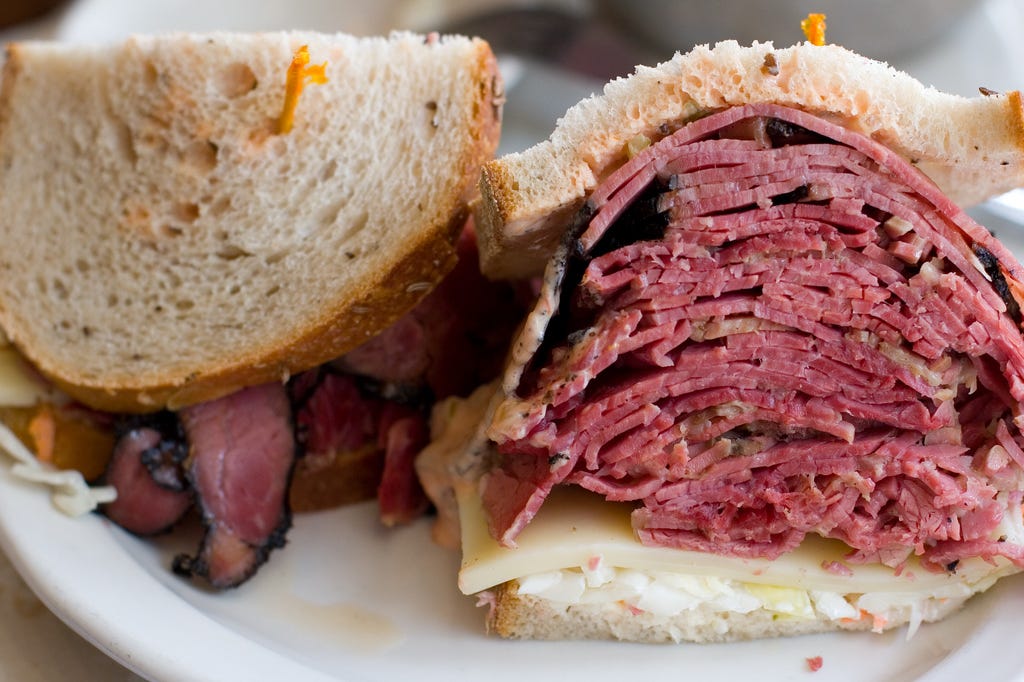Blue Ocean Example: Pastrami for Elvis
Odd combinations combine to make great food and also interesting business models.
People oftentimes fail to stretch far enough thinking about noncustomers, rarely going past what we refer to as Tier 1 noncustomers, current customers who dislike an offering. However, the group of Tier 2 noncustomers (those who should be attracted to an offering but aren’t) and Tier 3 (those distant) typically offer a much larger and more lucrative pool of people. Here is an illustration of how that might work.
I like food and I like businesses so restaurants hold enormous appeal.
But opening a restaurant is a terrible idea, right? After all, according to an American Express commercial 90% of restaurants fail after their first year. The industry is brutal to break into. You’re far better off, say, opening a business services company, a law firm, or a construction business, right?
That’s actually nonsense according to the US Bureau of Labor Statistics which tracks business failure. There are lots of articles here, here, and here, proving that restaurants aren’t actually a bad business to start at all. Plus, the raw data supports the same conclusion. The hours may stink but there are far worse businesses to go into.
About 15-17% of restaurants close in their first year of business, a lower figure than business services (19%), real-estate offices and brokerages (21%), construction (53%), and way lower than agriculture (65%). Professional and scientific services — the field your mother-in-law and Amex agree are for grown-ups — have a higher failure rate than restaurants at 19.4%.
It is true that most restaurants fail within five years but most businesses fail within five years. That applies to any business, not just restaurants.
Is there anything you can do, timing-wise, to increase your restaurant's chance of success?
Going by the numbers, yes.
Red Ocean Advantages
I typically focus on blue ocean strategy and, below, we walk through the thought process I’d use to create a blue ocean restaurant. But blue ocean strategy does not require ignoring red ocean advantages and, in this case, there are some strong competitive levers for startup restaurants.
Specifically, I’d plan on opening my restaurant in 2021 or 2022. Restaurants that opened in the years immediately after the last recession enjoyed a significantly higher long-term success rate than those established before or after. Why? Because the recession eliminated lots of competition, made vendors hungrier for new customers, and reduced the price of rent which is typically a restaurant’s highest fixed cost.
That’s even more true with the COVID recession. Landlords are desperate for commercial tenants. Now is the time to get a good deal on a great location and insist on a long lease: this is a renter’s market for commercial space. The countless food delivery apps, upcoming new business models like dark kitchens, and a dearth of restaurants that couldn’t pay their pre-COVID rent and folded put upstarts in the driver’s seat. Don’t hesitate to take advantage.
Blue Ocean Restauranteering
As explained in the blue ocean basic series of posts, blue ocean strategy is about differentiation and low cost. The basics of that involve defining a market, using the buyer utility map to find painpoints, running through the six paths to find opportunities, extracting key values of competition, then eliminating, reducing, raising, and creating those to define a new offering.
Whew. That was both a run-on sentence and a massive simplification. I really encourage you to read the posts, read the book, and don’t hesitate to link up with or contact me.
With that caveat, let me guide you through the thought process of an experienced blue ocean strategist if I was going to open my dream restaurant. I’m focused on opening a Jewish deli. Why? Because I like Jewish deli food and passion is a key ingredient in the success of any business.
I know that delis often have massive menus of similar food. Not mine. We’re going to vastly reduce the choices and offer a small but top-quality menu.
Those massive menus are made possible by buying lots of products from foodservice companies. We’re going to either make our food from scratch or buy it from vendors who make it from scratch; no mass-produced anything for us.
Our dining room will have a homey feel and our serving staff needn’t wear tuxedos. We’re serving matzoh ball soup with pastrami and fries, not foie gras. We’re reducing the accouterments many restaurants offer.
Great delis have top-tier smoked fish. We’ll smoke some ourselves but smoked fish is an art and there are only so many vendors in the US who’ve mastered it. Therefore, we’ll do something virtually nobody does; look to Eastern Europe where artisanal smoked fish is plentiful and cheap. While reducing mass-produced premade food we’ll raise sourced small-batch artisanal quality food.
Our fish will be flown in every day so we’re best off close to an airport to keep costs low. Lucky for us, there are lots of airports with high volume flights and some of them are in cities that don’t have much in the way of delis.
Memphis has the FedEx hub, low real-estate prices, and the locals happen to be barbecue fanatics. Further, yelp lists only five entries for the “top ten” Jewish delis in Memphis. One of those is the snack bar at the Jewish Community Center and another the cafeteria at a retirement home. A lack of dead-on competition is a good blue ocean marker.
Memphis doesn’t have a lot of Jews to visit our Jewish deli but that’s just fine because we’re aiming for noncustomers. Who might be interested in my high-quality deli foods, the sandwiches stacked to the sky? Memphis locals, that’s who. It doesn’t really make sense that they haven’t discovered Jewish delis, making them a perfect Tier 2 noncustomer group.
And who might find the Jewish part of a Jewish deli intriguing? The many, many evangelicals who live in and around Memphis. In fact, their churches might be a great way to spark an early interest in my new restaurant.
There’s actually nothing all that Jewish about Jewish deli food and a fine chance the southerners will think the homemade bread, soups, and smoked meats are every bit as awesome as my grandparents thought.
Finally, there’s the need to smoke my own briskets, pastrami, and corned beef. Lucky for me, there’s no shortage of experienced BBQ chefs in and around the area. They may be more used to smoking pork but I’m sure they can easily adapt.
Summary
A traditional red ocean marketer would say opening a Jewish deli in Memphis is dumb. There aren’t many Jews, they’d argue. Open your deli in Boca Raton, Florida.
Except that Boca is filled up with Jewish delis and they all compete with one another. Real-estate prices are sky-high, employee costs are steep, and nobody knows how to smoke meat. A sizable part of the population are “snowbirds” who disappear half the year leaving me with fixed costs but few customers.
In Boca, I’d have to get my fish from Miami International, a three-hour round-trip drive every day. Once established, I’d be competing with New Yorkers who grew up on the most authentic Jewish delis and who are picky. The things I’d have to do to please them would add to my cost structure and could turn off noncustomers.
My Jewish deli in Memphis makes sense. In Boca, the same offering becomes a red ocean mess.
Please subscribe to this newsletter:
Please share this post:





